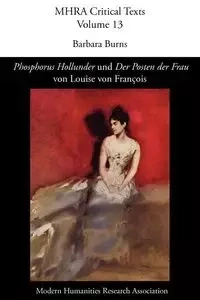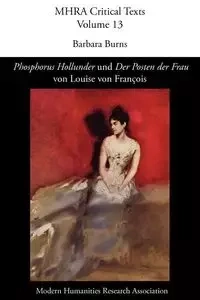'Phosphorus Hollunder' und 'Der Posten Der Frau' Von Louise Von François - Louise Von Franois
Louise von François (1817-1893) was a German writer of realist fiction and a contemporary of Fontane, Storm and Meyer. Her most famous novel, 'Die letzte Reckenburgerin' (1871), was regarded as one of the most innovative novels of the nineteenth century and attracted significant critical attention. François's novels and novellas are notable for their strong story lines, rich prose and psychological realism. Endorsing the values of honour and duty as prerequisites for the creation of a more equitable society, François shared with other literary figures of the period an antipathy toward class prejudice and religious intolerance. Despite François's didactic focus, however, her writing lacks neither wit nor suspense, and a firm grasp of narrative technique is her mainstay. Her talent for originality of construction results in highly readable stories that stand the test of time. 'Phosphorus Hollunder' focuses on the development of a male protagonist who is refined through suffering, relinquishing vanity and dilettantism for moral rectitude and responsibility, while also addressing the nineteenth-century social tensions resulting from class distinction and the decline of the nobility. It is a tale of unrequited love and betrayal which retains the reader's interest by challenging rather than capitulating to sentimental romantic stereotypes. 'Der Posten der Frau' is set against the backdrop of the Seven Years' War, and portrays the struggle of a disenchanted young woman to find an appropriate wartime role. Without glamorising her function, François elevates the woman's status from that of passive and powerless observer to authoritative sustainer of domestic and social stability. The novella offers a subtle exploration of the ambiguous distinction between the categories of friend and foe, and implies a challenge to traditional feminine identity. Barbara Burns is a senior lecturer in the German Department at the University of Glasgow.
EAN: 9780947623753




Louise von François (1817-1893) was a German writer of realist fiction and a contemporary of Fontane, Storm and Meyer. Her most famous novel, 'Die letzte Reckenburgerin' (1871), was regarded as one of the most innovative novels of the nineteenth century and attracted significant critical attention. François's novels and novellas are notable for their strong story lines, rich prose and psychological realism. Endorsing the values of honour and duty as prerequisites for the creation of a more equitable society, François shared with other literary figures of the period an antipathy toward class prejudice and religious intolerance. Despite François's didactic focus, however, her writing lacks neither wit nor suspense, and a firm grasp of narrative technique is her mainstay. Her talent for originality of construction results in highly readable stories that stand the test of time. 'Phosphorus Hollunder' focuses on the development of a male protagonist who is refined through suffering, relinquishing vanity and dilettantism for moral rectitude and responsibility, while also addressing the nineteenth-century social tensions resulting from class distinction and the decline of the nobility. It is a tale of unrequited love and betrayal which retains the reader's interest by challenging rather than capitulating to sentimental romantic stereotypes. 'Der Posten der Frau' is set against the backdrop of the Seven Years' War, and portrays the struggle of a disenchanted young woman to find an appropriate wartime role. Without glamorising her function, François elevates the woman's status from that of passive and powerless observer to authoritative sustainer of domestic and social stability. The novella offers a subtle exploration of the ambiguous distinction between the categories of friend and foe, and implies a challenge to traditional feminine identity. Barbara Burns is a senior lecturer in the German Department at the University of Glasgow.
EAN: 9780947623753

